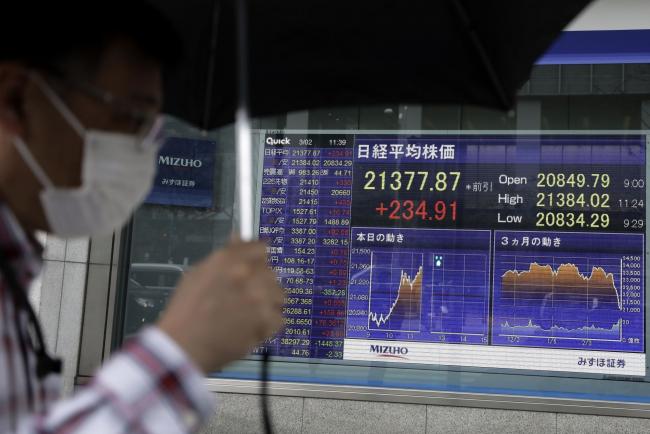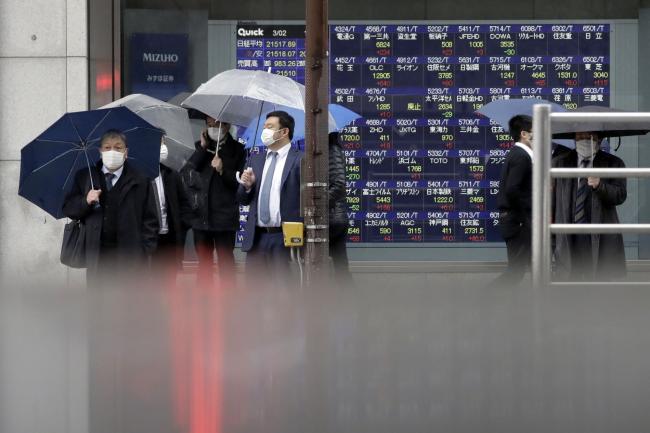(Bloomberg) -- U.S. equity futures and Asian stocks retreated with Treasury yields as investors awaited details from the Trump administration on planned stimulus measures to counter the coronavirus impact.
S&P 500 futures fell almost 3%, following a strong rebound on Wall Street after Monday’s plunge. President Donald Trump didn’t appear at a briefing on the outbreak after promising a day earlier he would announce a “major” economic package, leaving investors waiting. The yen advanced with Treasuries and gold, indicating a return of safe-haven appetite. Shares fell in Japan, Australia and South Korea, with more modest declines in Hong Kong and China. Oil extended its rally on the back of Monday’s crash, though trimmed earlier gains of as much as 5.8%.
Australia joined peers from Japan to Brazil to Italy that have sunk into a bear market this month.
“We saw a relief rally yesterday that just hasn’t been sustainable,” Kerry Craig, global market strategist at JPMorgan (NYSE:JPM) Asset Management in Melbourne, told Bloomberg TV. A delayed response raises the risk that “employment growth starts to fall, unemployment starts to rise -- and that’s a more difficult story to try to reverse and see growth come back later in the year,” he said.
Meantime, Joe Biden appeared to cement his position as front-runner for the U.S. Democratic presidential nomination with primary victories Tuesday, further easing concerns among those opposing Bernie Sanders’s progressive platform.
Volatility continued to grip global financial markets rattled by the virus and an all-out oil price war. U.S. stocks plunged the most since 2008 on Monday, and further selling took futures 20% from records before the rally sparked by Trump’s promise for action Tuesday.
“We are strongly advocating do not sell in panic and fear because nobody really knows what the extent of the virus will be or the price war on oil,” Sandip Bhagat, chief investment officer at Whittier Trust, said on Bloomberg TV. “We know the repricing to this new reality will be slow, will be painful and it will take a long time.”
Elsewhere, Australian bonds gained after the central bank reiterated previous signals that any quantitative easing measures would focus on yield “objectives” rather than set levels of bond purchases.
Here are some key events coming up:
- The European Central Bank’s policy decision comes Thursday amid expectations it may ease policy.
- The U.K. Chancellor of the Exchequer unveils the government’s 2020 budget on Wednesday.
- The U.S. core consumer price index, due Wednesday, is expected to remain subdued in February.
Stocks
- Japan’s Topix index dropped 1.2% as of 2:30 p.m. in Tokyo.
- South Korea’s Kospi index slid 3%.
- Hong Kong’s Hang Seng Index fell 0.6%.
- The Shanghai Composite Index fell 0.2%.
- Australia’s S&P/ASX 200 Index lost 3.6%.
- S&P 500 futures fell 2.7%. The index rose 4.9% on Tuesday.
- Euro Stoxx 50 futures rose 0.3%.
- MSCI Asia Pacific Index fell 1.4%.
- The yen rose 1.3% to 104.30 per dollar.
- The offshore yuan was at 6.9567 per dollar, up 0.1%.
- The euro bought $1.1344, up 0.6%.
- Bloomberg Dollar Spot Index fell 0.3%.
- The yield on 10-year Treasuries dipped about 15 basis points to 0.66%.
- Australia’s 10-year bond yield fell about 11 basis points to 0.68%.


- West Texas Intermediate crude gained 1.2% to $34.74 a barrel.
- Gold added 0.8% to $1,662.92 an ounce.